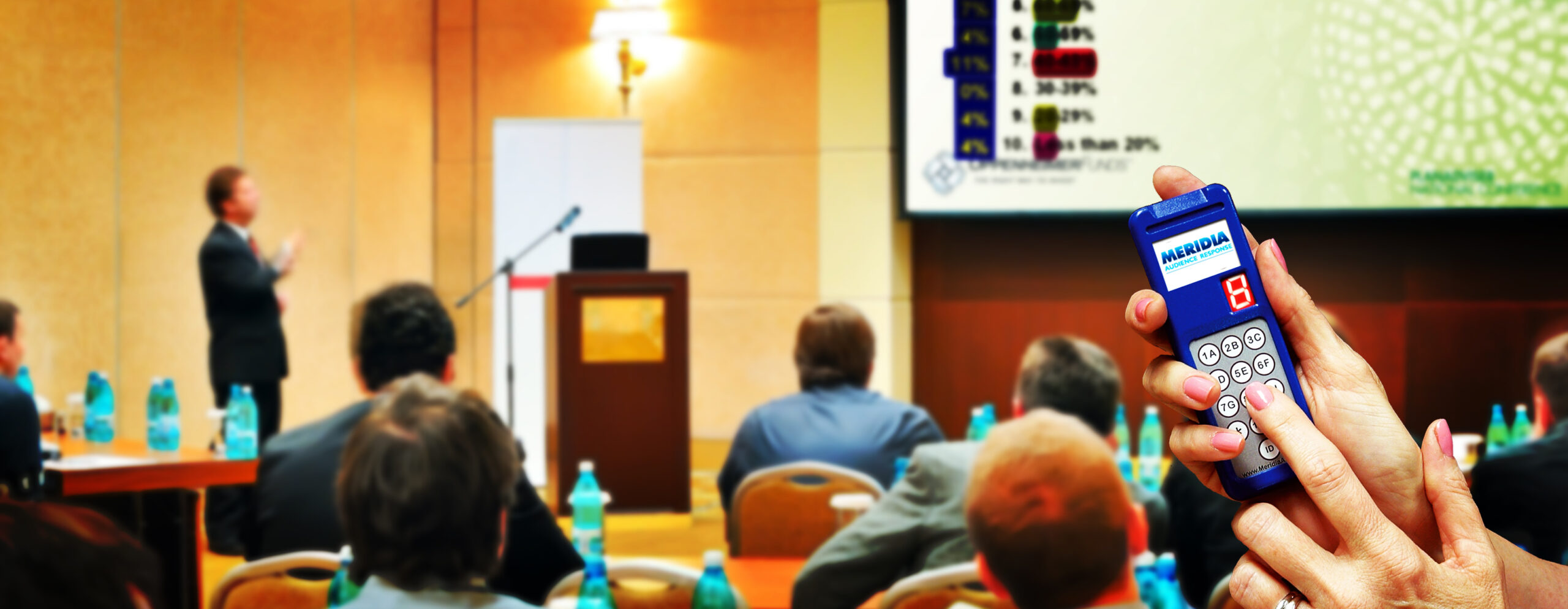Meridia’s Technology Makes a Connection
No napping will be tolerated during your next conference if Meridia is involved. At conferences served by Meridia Interactive Solutions, based out of Malvern, PA, participants will be expected to, well, participate. And they will be able to participate more effectively, thanks to the conferencing system that Meridia supplies.
Using wireless keypads the size of paperback, conference-goers can voice opinions and ask or answer questions. Computers tabulate and display the results. “We can collect thousands of responses in two-and-a-half seconds,” said McPeak, CEO of the 15-person, “40 year-old startup.” “By adding this element, you can get immediate feedback.”
Each keypad contains a two-way radio that sends a signal to antennas placed around a room. Responses are tallied in a computer, specially built by Meridia, with a radio receiver plugged into its serial port. Software then compiles the data, converts it to a graph, chart or numeric form, and displays it on a screen.
Snoozers can be shamed into action if meeting organizers want everyone involved: The ARS software can identify keypads that sent no reply. Lee Falk, a partner at the Philadelphia law firm Morgan Lewis & Bockius calls himself “a huge fan” of Meridia. He used the system during a session involving employee benefits at the Convention Center, at which 300 people participated.
Falk created scenarios based on current legal issues and broke them into questions for the audience to answer via the keypad. “We asked three or four questions on each case and the audience logged in their responses. I didn’t show the results right away. Then I had a lawyer from our firm argue the plaintiff’s case and the defendant’s case. After the lawyers argued the merits of both sides, we let the audience vote again and then showed both sets of responses.”
Participants answered more freely, he said, because replies were private, instead of speaking out and risking a wrong answer. And because participants are involved, they feel obligated to read printed materials they receive as part of the program, Falk said.
Meridia has been used in large conferences with thousands of people in a single room, such as a May meeting of the sales force for the new drug Viagra, McPeak said. Other uses for audience-response technology are in market research using focus groups or in multiple-location classrooms. Car companies have used the system to get feedback after test-drives.
Meridia’s keypads were used at the TED Conference in Monterey, Calif., said David Sume, program director for the event, which discusses the convergence of the technology, entertainment and design industries. The technology allowed people to participate in the meeting from their seats, while the presenter focused on delivering the presentation content.
Yet interactive ability and anonymity demands speakers do more than just prepare another boilerplate speech with slides, said Mark Jordan, marketing director at McGettigan Partners, a local meeting planner. Among the strongest benefits knows immediately by the number of replies whether the audience is interested.
Until a few years ago, market research companies and even the Franklin Institute’s Futures Center relied on wired, built-in response systems in conference rooms. With wireless technology, there are no limitations.
The price for Meridia’s system starts at about $2,200 and rises depending on the number of keypads, length of the meeting and staffing needed for the event, McPeak states.
Meridia’s sparsely furnished, jam-packed office hums with people programming the equipment and packing it in custom-made cases for delivery to meeting sites worldwide. Their single-story suburban office has a concrete pad outside covered by a metal awning designed specifically for the FedEx truck that–twice daily–comes to pick up and drop off the suitcase-sized cases.
The company’s original owner, Raymond Baker, began developing a wireless audience response product about 20 years ago. Originally created in 1970 to make slides for presentations, Meridia specialized in meeting services. But, technology made that work obsolete and, in the late 1980s, recession cut travel and meeting budgets, forcing an industry-wide consolidation. That was when Baker chose to focus only on audience-response technology. Sean McPeak claims that Meridia is the largest company in its field, grows annually and is profitable.
“This business is an ongoing process,” McPeak said. “It’s all about refinement and designing programs that meet a client’s specific needs–new layouts, new features, new options–all in the interest of providing quality customer service.”

